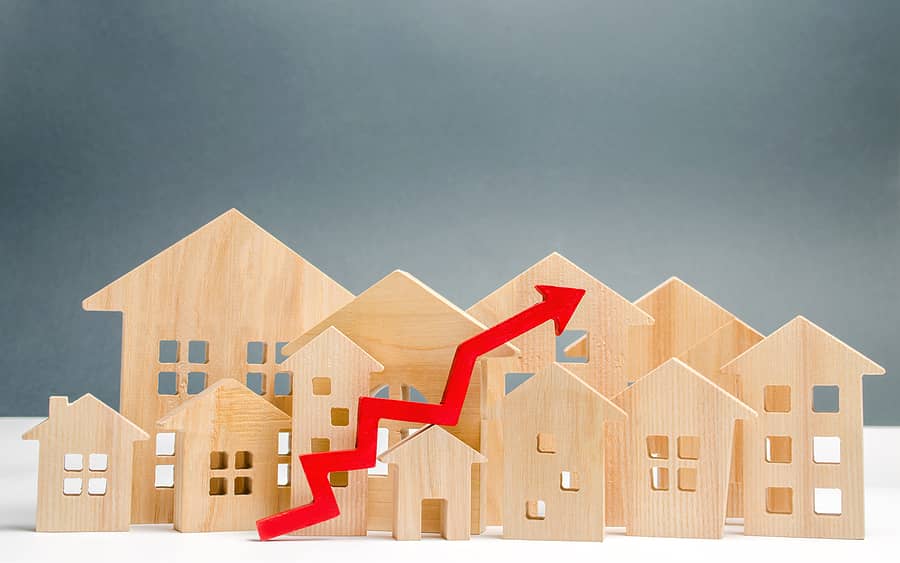Private mortgage lenders use a variety of different factors to determine interest rates. For some, the higher the Loan to Value Ratio (LTV), the higher the fees. Others charge more for a product like a second mortgage or a power of sale. The rates can change every few months depending on market conditions.
What factors influence the interest rates offered by private mortgage lenders?
All lenders, including private lenders, banks and credit unions, are risk-averse. They want to mitigate their risk as best they can when providing mortgage financing. To reduce their risks, they highlight a few different aspects before approving a mortgage or loan, including:
The Appraised Value of The Home
Determining the value of any property is a critical step. An appraisal will look at different features, including the location, square footage, number of bathrooms and bedrooms, and the age of any property. The appraisal is also a key way that a private lender can assess the property’s current condition. The “ Direct Comparison Approach” to appraisals will look at what similar properties have sold for to estimate a value. The Appraisal Institute of Canada is a good resource for understanding the process.
The Location
In rare circumstances, the land that a building sits on can be worth more than the actual structure. Other factors that can affect interest rates include proximity to amenities and transportation. That includes shopping, restaurants, schools, roads, and other cities for commuting.
Classification as an “urban area” is another factor when it comes to interest rates. Private lenders widely believe that in-demand houses in urban areas are more likely to retain value or increase in value over time. Historically, that meant urban houses and other types of dwellings got better rates as they were seen as more financially secure Investments.
How do market conditions specifically affect private mortgage interest rates?
It’s essential to remember that even small changes in interest rates can make a big difference in mortgage rates. Generally speaking, a strong economy leads to higher interest rates, while a weak one has the opposite effect.
The demand for credit spikes during economic growth cycles, which can drive interest rates up because lenders are looking to balance supply and demand. Inflation expectations are another factor. Central banks can raise interest rates during economic growth to curb it. That means private lenders need to follow suit.
When the economy slows down, lower demand and economic activity drop off. During those cycles, interest rates can drop.
Getting a complete picture of both these rates also means a deeper dive into borrower benchmarks.
Are there specific borrower criteria that notably impact interest rates from private lenders?
Private lenders focus on a metric called the Loan-to-Value ratio. It’s one of the most significant differences between a private mortgage and one you might get from a more traditional lending institution.
To calculate the LTV ratio, private lenders divide the amount of the requested mortgage plus existing mortgages by the appraised market value of the home or other property.
Here is an example of how an LTV ratio is calculated:
A property might have a market value of $1 million. With a mortgage of $750,000 on that property, it has an LTV of 75%.
Most private lenders will not consider approving a loan if the requested mortgage has an LTV ratio of more than 75%. One significant difference here from traditional loans is that an alternative lender’s process is more user-friendly and streamlined. The type of property also affects the interest rates.
How does the type of property significantly affect interest rates from private lenders?
The type of property can influence any interest rate decision. Here are a few things to consider.
The risk assessment is one of the first things private lenders and or traditional banks consider. Residential properties are generally considered less risky than vacant land and or commercial properties. These typically have a higher market demand and more liquidity. That often translates into lower risk and potentially lower interest rates.
Private lenders can also look at any property’s ability to generate a consistent flow of income when determining their interest rate. Multi-family units are considered positively.
Practical strategies for better private mortgage interest rates
Before you meet with a private lender, it’s a good idea to take some steps to make sure the process goes more smoothly, and you get a favorable interest rate.
- The available home equity is the main factor in determining the interest rate. Lenders usually require over 25% of existing equity. It’s important to have equity, but just as crucial to shop around for the best rates.
- Private lenders also require that people who own rural properties have more equity built up. There’s a lower consumer demand and a slower rate of appreciation. Generally, these homeowners will need over 30% home equity. If you find yourself in this position, using a mortgage broker is a good solution. Mortgage brokers usually don’t work for one specific lender.
- Private lenders use current income levels differently from banks. They are much more lenient and consider different sources of income, including self-employment and contract work. In some situations, it’s possible to negotiate or refinance a mortgage during the term when the rates have dropped.
Private lenders can also look at additional assets before deciding on an interest rate. Applicants with higher-value assets will be charged a lower rate if they use these as collateral.
Looking for Private Mortgage Lenders?
Mortgage Broker Store focuses on private mortgage-related products. Mortgage applications that don’t meet traditional lending requirements are a specialty. Our team of private lenders, brokers, and licensed mortgage agents are ready to help. Let us help you get a mortgage loan that fits your requirements today.
Email ron@mortgagebrokerstore.com or call 416-499-2122.



